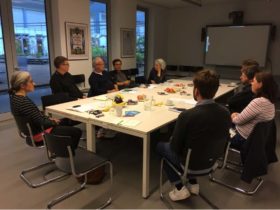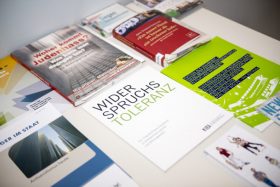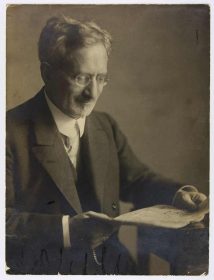A conference on anti-Semitism-critical adult education
My W. Michael Blumenthal Fellowship at the Jewish Museum Berlin on the topic Didactics of the Middle East Conflict ended in the beautiful month of May. During the past seventeen months, I have been intensively engaged with continuing education on this politically contentious and very emotionally charged topic, as well as with the question of what we as teachers of social studies or educators working outside of school systems can or should not do, in order to best approach the topic of the Near-East conflict with students (more at: www.jmberlin.de/fellow-rosa-fava-and-her-research).

Discussion of the participants; photo: Berivan Köroğlu
In retrospect, one of the highlights of the conference, which I organized in early April 2018 in order to bring together educators focusing on the Middle East conflict and Anti-Semitism with museum employees working in the areas of education and the Academy programs. Since the first conference in September 2017, the parameters had changed somewhat, since the opening of the Welcome to Jerusalem exhibition made the Middle East conflict an (even bigger) presence at the Jewish Museum. → continue reading
Experts discuss political adult education on the Middle East conflict

Many educational providers offer materials for confronting anti-Semitism pedagogically; Jewish Museum Berlin, photo: Nadja Rentzsch
“Emotional” and “complex” are words often used to describe the Middle East conflict and approaches to it. How should it be handled in the everyday practice of education and continuing education? This is one of the questions in my research project “Didactics of the Middle East Conflict,” which I am conducting as a W. M. Blumenthal Fellow (more about the project on the museum website).
At a university or an institute, generally there is a research colloquium full of people working on similar themes, or who at least come from the same discipline. In such colloquia, one can present new work, discuss initial findings, get feedback about dealing with difficulties, and discover stimulating new ideas. At a museum, people engage with a great variety of topics, but not with empirical research on the didactics of the Middle East conflict. And so on September 8th, I invited external experts on educational work relating to the Middle East conflict, anti-Semitism, and racism to come to the museum. We discussed teaching and learning on this subject with members of the Education Department and the museum’s Academy Programs. → continue reading
The 1930 German Federal Election

Heinz Arzt reading the newspaper, 1920; Jewish Museum Berlin, gift of Hilde Pearton, née Bialostotzky
Recently I was leafing through the inventory listing of a family collection that has been in our archives for many years. I wanted to rework the index in order to bring it up to our current standards. The collection included documents, photographs, and objects from the Arzt and Bialostotzky families. In the twenty-three page inventory, a letter was listed for the Berlin liqueur manufacturer Heinz Arzt (1866–1931) in the category “correspondence,” but neither a sender nor recipient was listed, to say nothing of its contents. The extremely brief description went: “Letter: hand-written, 14 Sept. 1930.”
So I went into the archives and pulled the document numbered 2001/219/28 from box 451 to complete the listing. Suddenly, I was holding a fascinating piece of history in my hands: the so-called letter turned out to be a brief report on the Reichstag election eighty-seven years ago. → continue reading


